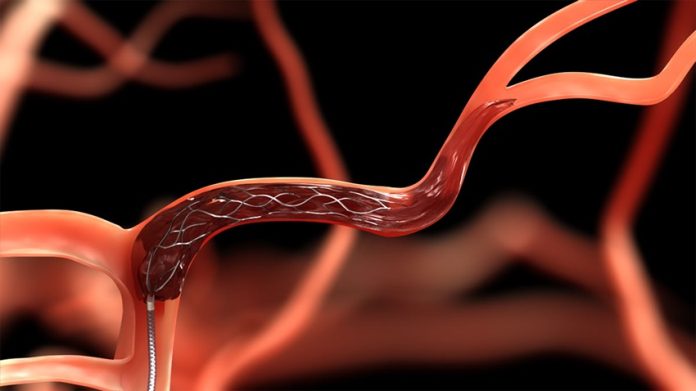UCLA researchers note that the difference between a good outcome and serious brain damage after suffering a stroke can be a matter of minutes. They have shown for the first time that prompt treatment with a new-generation stent clot retrieval device results in markedly improved outcomes, and that even a five-minute delay can negatively impact a patient.
The researchers found that when blood flow was restored to the brain within four hours after a stroke occurred, 80% of patients had a very good outcome; they not only survived but also were able to live independently. In addition, the investigators found that the odds of a worse outcome increased by 1% for every five minutes that passed between the onset of a stroke and the time when the blocked artery was reopened, noted Sunil Sheth, MD, a fellow in radiological sciences at the David Geffen School of Medicine at UCLA. He explained, “The impact of the speed of treatment was found to be enormous. These findings indicate that stroke centers worldwide should strive to bring patients quickly to comprehensive stroke centers offering this therapy, and that those centers should work to shorten the times from patient arrival to artery reopening.”
Physicians’ ability to restore blood flow to a patient’s brain after a stroke has advanced tremendously in recent years; this treatment improvement is mainly due to the development of stent retrieval devices that remove clots from the blocked artery. Each device consists of a thin mesh column that is introduced into a blood vessel in the leg and guided up to the blocked blood vessel in the brain, where it captures and removes the clot to restore the brain’s blood flow.
The study authors note that new-generation devices have an improved design that allows them to more easily trap and remove the clot and that the first clot retrieval device for stroke was invented at UCLA. “When it comes to treating stroke, every minute counts,” noted senior author Jeffrey Saver, MD, director of the UCLA Stroke Center. He added, “The faster you can restore the blood flow to normal, the better the chances of a good recovery. Our study shows that the currently used stent clot retrieval devices are a tremendous improvement from the older technologies.”
Dr. Saver stressed that a number of changes should be implemented immediately across the entire gamut of stroke care, including improving public awareness regarding the signs and symptoms of stroke, educating emergency medical crews to route patients to an appropriate medical center, and monitoring the quality of care that individuals receive in the hospital. He explained that previous studies have assessed the impact of speed of clot retrieval; however, they analyzed data from outdated trials that used obsolete techniques and devices. The new research is the first to use data from the version of the devices currently in use.
Dr. Sheth noted that the UCLA researchers took a more advanced look at how stroke patients fared after receiving treatment. Instead of lumping them into two groups, “good” and “bad”, as previous studies did, they used the results of detailed patient interviews and neurological exams to divide the patients into seven different categories, which more accurately reflect an individual’s experiences of stroke recovery. Even when physicians are able to clear the blocked blood vessel promptly, not all patients experience a full recovery. In a future study, the UCLA investigators will focus on ways to identify which patients are at an increased risk of poor outcomes, in order to improve doctors’ ability to provide accurate prognostic information to them and their families.
The study authors note, “As clinicians we are constantly reminded of the challenges brought on by neurological deficits in our patients. More granular analyses such as these that are sensitive to detect smaller changes in disability allow for richer discussions when advising on treatment approaches, as well as providing counseling in the acute setting.”
According to the American Heart Association and the American Stroke Association, stroke is the fourth most common cause of death and a leading cause of adult disability in the US. On average, one American suffers a stroke every 40 seconds and one dies of a stroke every four minutes. It is estimated that 795,000 Americans suffer a new or recurrent stroke each year.








